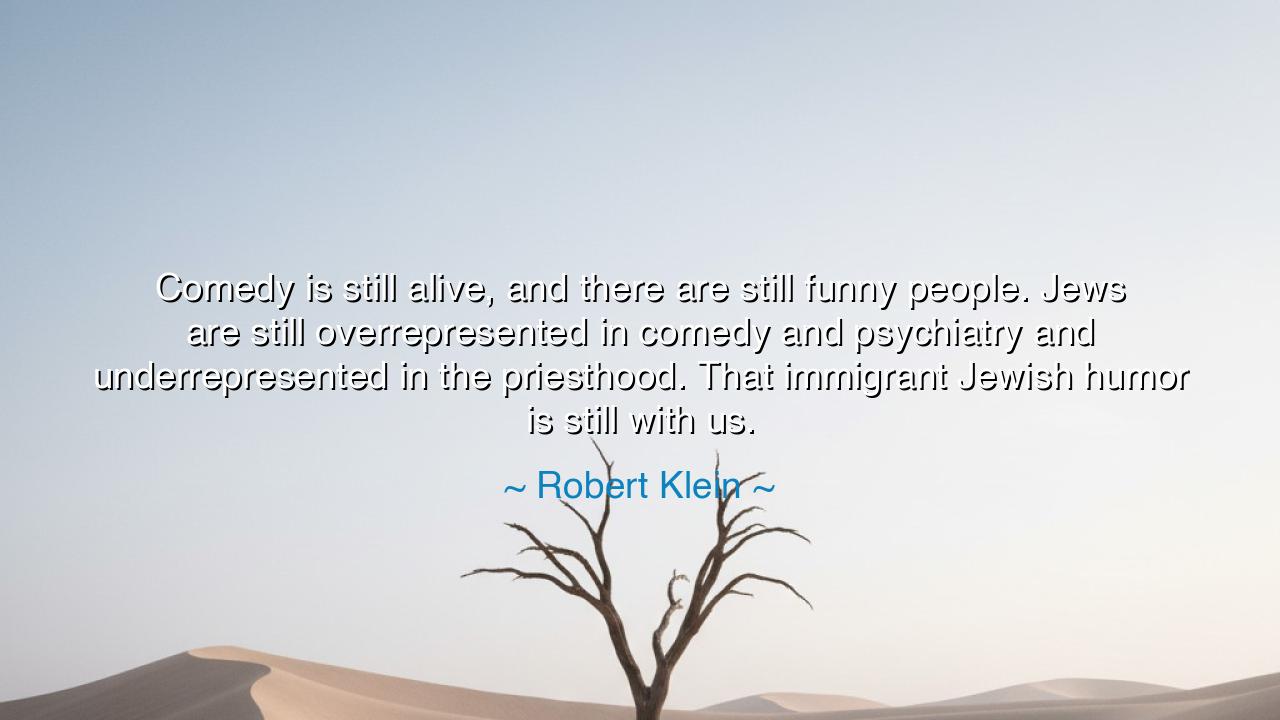
Comedy is still alive, and there are still funny people. Jews are
Comedy is still alive, and there are still funny people. Jews are still overrepresented in comedy and psychiatry and underrepresented in the priesthood. That immigrant Jewish humor is still with us.






There are truths about a people that cannot be found in history books or measured by numbers — they are carried instead in laughter, in stories, in the quiet courage of the heart. When Robert Klein declared, “Comedy is still alive, and there are still funny people. Jews are still overrepresented in comedy and psychiatry and underrepresented in the priesthood. That immigrant Jewish humor is still with us,” he was not merely speaking of jokes or professions. He was testifying to the endurance of a spirit — the power of a people who, through suffering and survival, turned their pain into wit, their exile into wisdom, and their tears into laughter.
The origin of this reflection reaches deep into the story of the Jewish people, a people who have wandered through centuries of persecution, displacement, and hope — yet have always carried with them the light of humor. From the villages of Eastern Europe to the bustling streets of New York, Jewish immigrants brought with them a language of laughter that was not shallow, but redemptive. Their humor was born not of luxury, but of necessity — the weapon of the powerless, the comfort of the exiled, the defiance of those who refused to surrender their humanity in the face of cruelty. When Klein says “that immigrant Jewish humor is still with us,” he speaks of a sacred inheritance — a way of seeing the absurdity of life without losing faith in it.
To understand this humor is to see how it intertwines comedy and tragedy, for Jewish laughter has always carried the shadow of endurance. It is the laughter of a people who have seen too much to take the world too seriously. It mocks tyranny, punctures arrogance, and yet never forgets compassion. Consider the wisdom of Sholem Aleichem, whose stories of Tevye the Dairyman gave birth to the beloved Fiddler on the Roof. In Tevye’s self-deprecating jokes, his sighs and one-liners to God, there is both suffering and transcendence. “If wealth is a curse,” Tevye says, “may God smite me with it — and may I never recover!” Such humor is more than amusement — it is a theology of survival, a philosophy that teaches: if we can still laugh, we have not been conquered.
Klein’s reference to Jews being overrepresented in comedy and psychiatry speaks to something profound: both arts require the ability to look deeply into the human soul. The comedian and the psychiatrist are kin — both dissect the absurdities of human behavior, both offer healing through truth and reflection. One does it with laughter, the other with listening, but both arise from the same tradition of introspection. And the Jewish experience, steeped in study, questioning, and moral thought, naturally gave rise to both. It is no accident that Sigmund Freud, the father of psychoanalysis, was also a man who understood the psychological depth of humor, writing that jokes reveal “the deepest desires of the mind disguised in play.”
The underrepresentation in the priesthood, as Klein wryly observes, is itself a joke — a nod to the Jewish tradition of questioning rather than preaching. In the world of faith, the rabbi’s strength lies not in dogma, but in dialogue; not in commanding belief, but in provoking thought. And so, humor becomes a form of spiritual questioning — a way to confront God, fate, and injustice with honesty and irony. When the rabbi asks, “Why did God create man?” and answers, “Because He loves stories,” he is doing what Jewish humor has always done: turning divine mystery into human connection.
To say that comedy is still alive is to affirm that resilience still breathes in the world. The immigrant’s wit, the exile’s wisdom, the survivor’s smile — these are proof that the human spirit cannot be crushed. Jewish humor, passed through centuries, has become part of the global voice of comedy, from the wry skepticism of Woody Allen to the sharp satire of Mel Brooks and the warm irony of Jerry Seinfeld. Through them, the laughter of generations echoes — laughter that questions, laughter that heals, laughter that remembers.
So, my child, remember this truth: laughter is a form of survival, and humor is a form of faith. When life weighs heavy, do not turn away from laughter, for it is the soul’s rebellion against despair. Learn from the Jewish spirit — to find meaning even in misfortune, to see comedy not as escape, but as endurance. Laugh not to forget the world’s sorrow, but to remind yourself that joy is stronger. As Klein reminds us, the humor of the immigrant is the humor of all humanity — proof that wherever there is courage, wherever there is love, and wherever a heart dares to find light in the darkness, there too will always be laughter.






AAdministratorAdministrator
Welcome, honored guests. Please leave a comment, we will respond soon